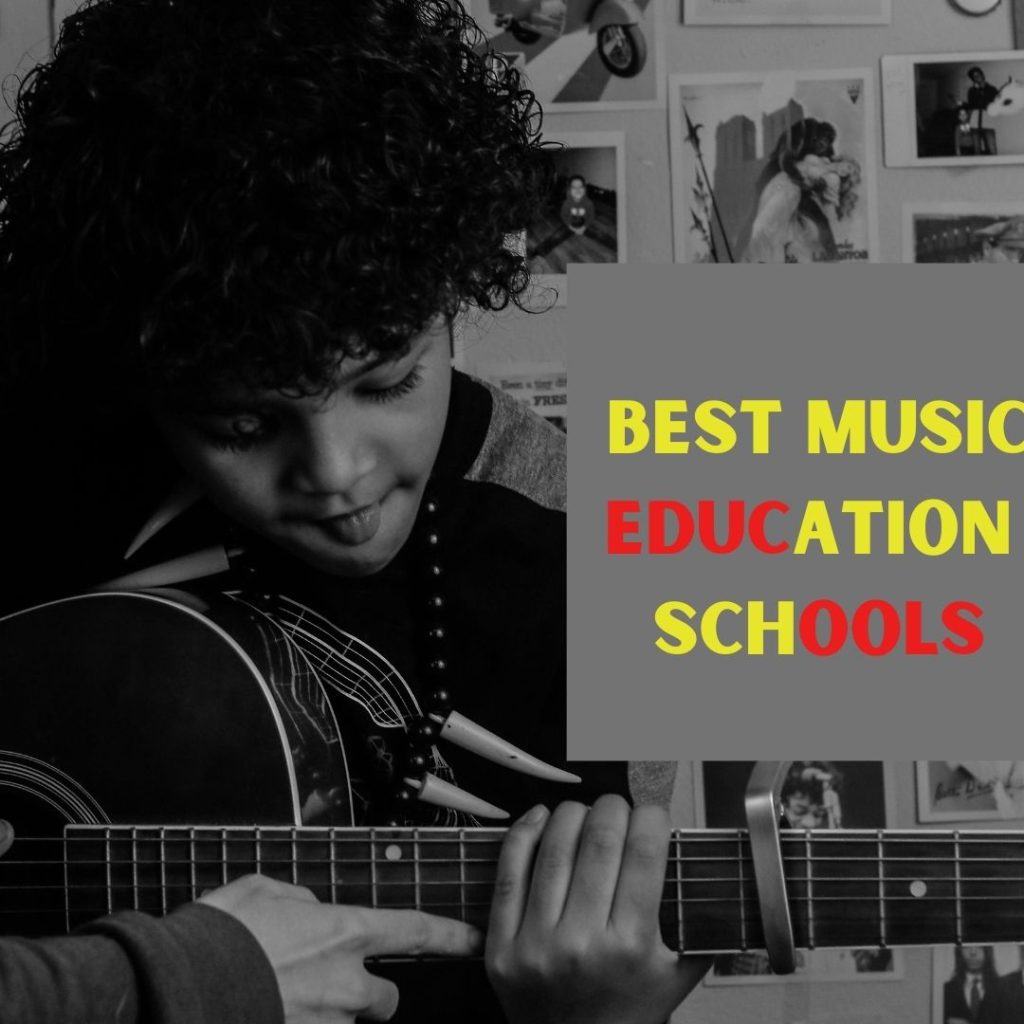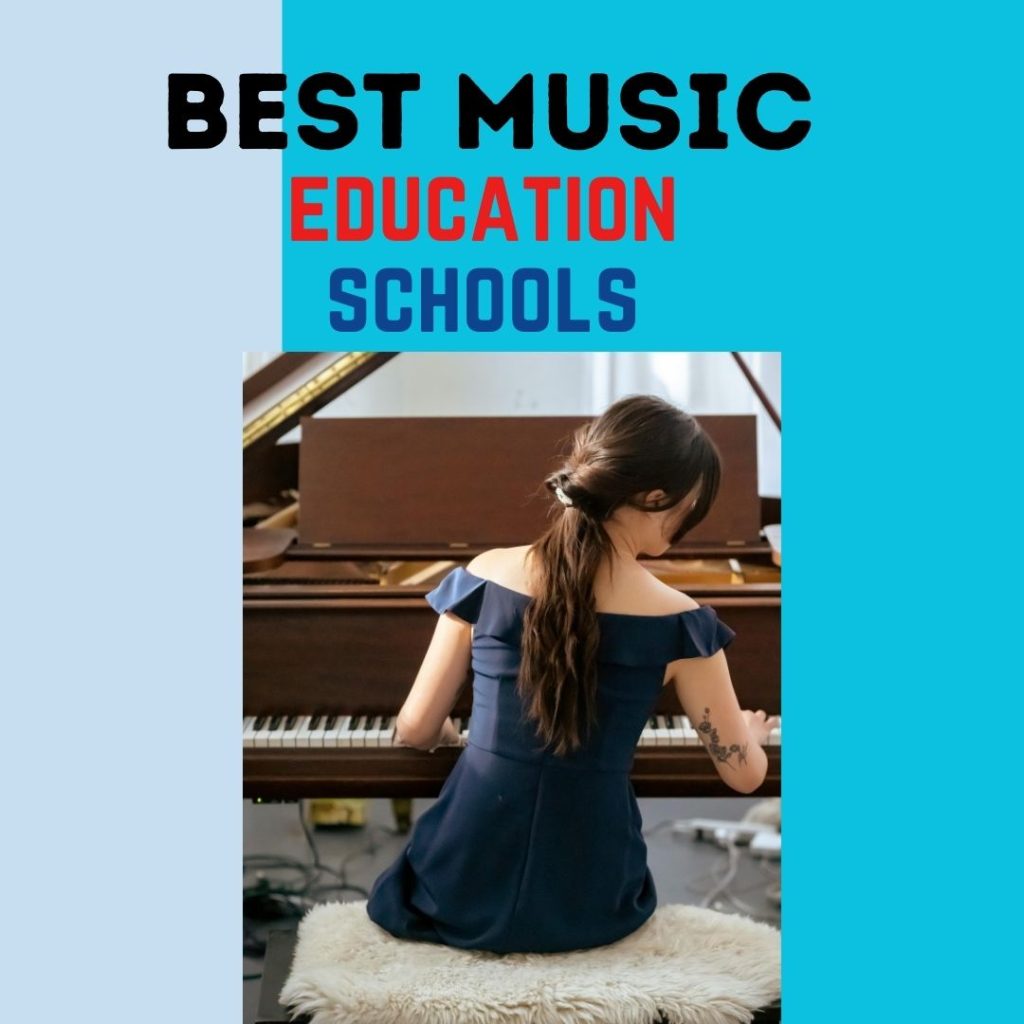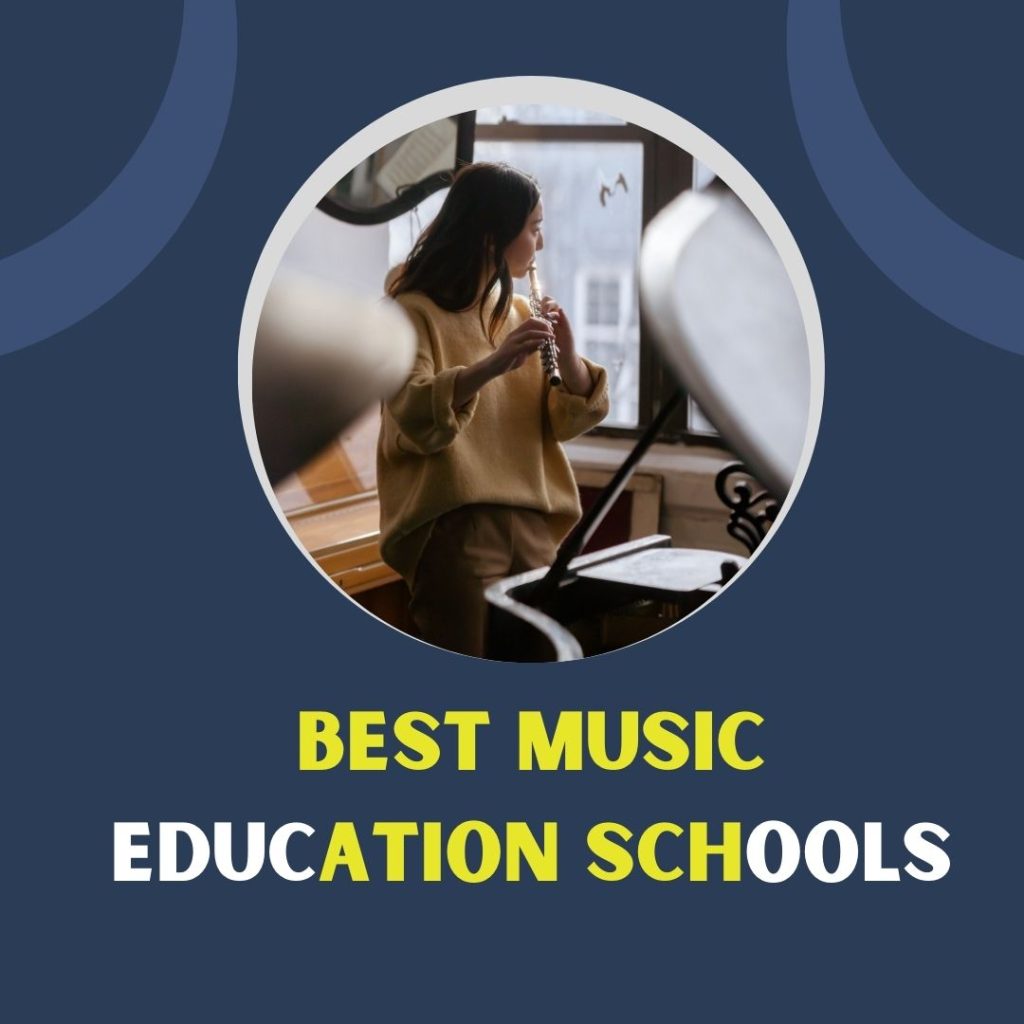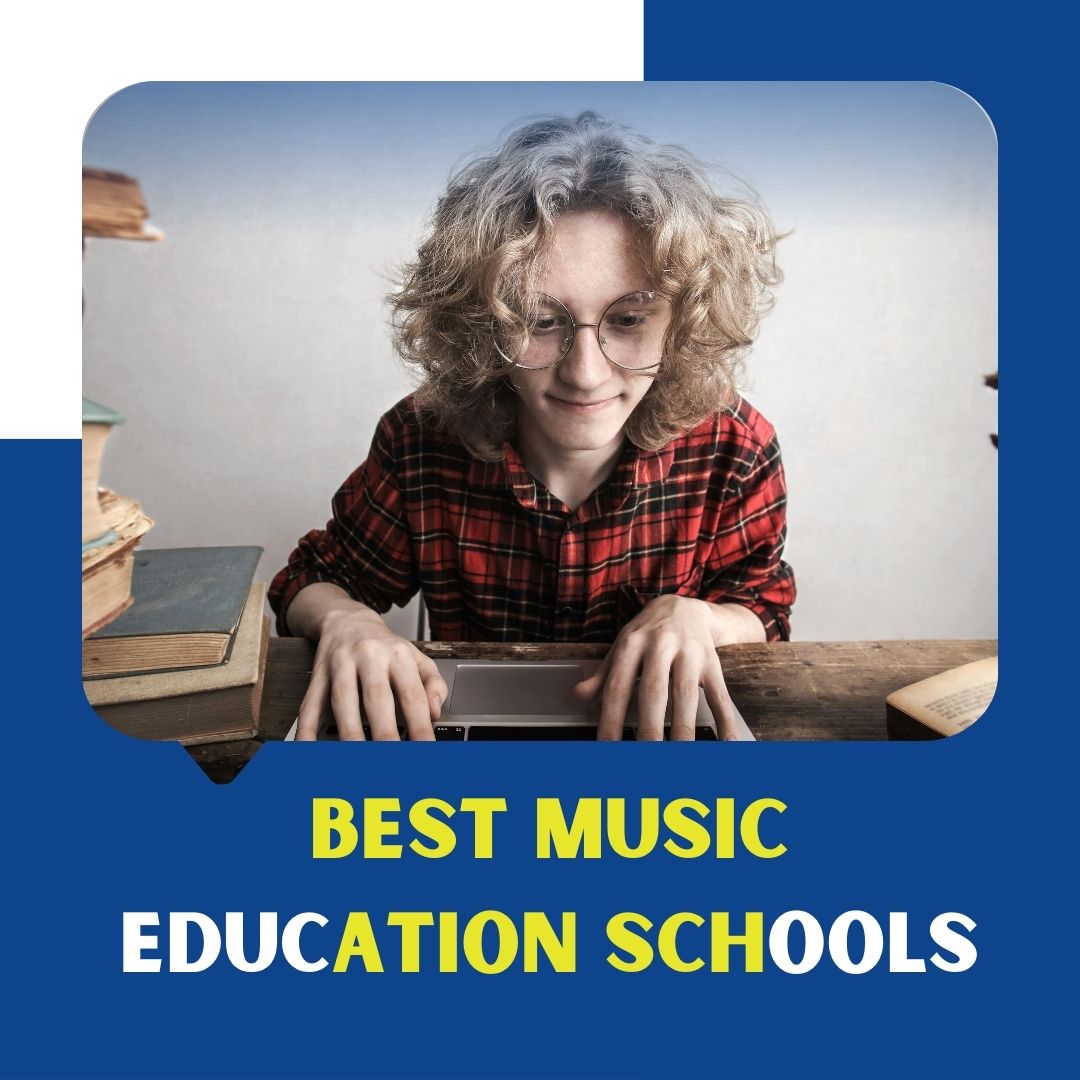Best Music Education Schools for Musicians to Grow Skills
The Juilliard School and Berklee College of Music are among the best music education institutions. They boast robust programs and distinguished alumni.
Selecting the perfect institution for music education can shape your artistic journey and career. The Juilliard School, located in the heart of New York City, offers a rich environment for cultivating musical excellence, with programs that cover classical, jazz, and contemporary genres.
Berklee College of Music, stationed in Boston, is renowned for its diverse approach to music education, encouraging creativity across jazz, rock, pop, and more. Both schools have produced musicians of the highest caliber, contributing to their reputations as top choices for aspiring music professionals. Choosing between these leading music schools requires consideration of your personal style, educational needs, and career aspirations. With their cutting-edge facilities and opportunities for live performance, they prepare students to excel in the competitive music industry.
Harmony In Education: Selecting A Music School
Music shapes minds, builds dreams, and molds futures. It’s the pulse of artistic education. The right music school can set the stage for a symphony of successes. It can be a challenging yet thrilling journey to find that perfect institution. This guide dials in on how to tune into the best music education schools.
Key Factors To Consider
Choosing a music school involves a medley of considerations. The school must fit your personal and professional aspirations. Here are key factors to strike the right chord:
- Program Diversity: Does the school offer a wide range of music disciplines?
- Faculty Expertise: Are the instructors renowned and experienced musicians?
- Facilities: Do they provide state-of-the-art rehearsal and performance spaces?
- Location: Is the school situated in an area thriving with musical opportunities?
- Financial Aspects: What kind of scholarships, grants, or financial aid are available?
Reputation And Alumni Success
A school’s prestige can often signal quality education. A reputation for excellence opens doors. It speaks volumes about the school’s impact in the music field. Let’s look at some indicators of a top-tier music school:
| Awards and Rankings | Notable Alumni | Career Services |
|---|---|---|
| Has the school been recognized in the industry? | Who are the successful graduates? | Does the school support career growth? |
The stories of alumni reflect the school’s mentorship and network. They often return to inspire current students. A school with an active and engaged alumni base speaks to lasting relationships. These are formed during and after the music education journey.
The World’s Stages: Top Music Schools Globally
The quest for musical mastery often leads aspiring artists to prestigious schools. These institutions boast legendary alumni, exceptional facilities, and global recognition. Let’s embark on a worldwide journey to uncover the finest music schools.
Europe’s Finest Conservatories
In Europe, history and harmony blend seamlessly. Some of the world’s oldest and most venerated music conservatories reside here. They have honed countless musical talents over centuries.
- The Royal Academy of Music in London nurtures musical finesse with a global impact.
- Paris Conservatory offers a deep dive into classical traditions and modern interpretations.
- Moscow Conservatory, steeped in Russian melodic heritage, fosters technical prowess.
America’s Prolific Institutions
America’s music schools stand as beacons of contemporary music education. Here, innovation meets tradition in a vibrant educational setting. Students gain exposure to diverse musical genres.
| School | Location | Specializations |
|---|---|---|
| Juilliard School | New York | Classical, Jazz, Dance |
| Berklee College of Music | Boston | Contemporary, Technology |
| Curtis Institute of Music | Philadelphia | Orchestral Studies, Opera |

Specialized Programs: Classical To Contemporary
Choosing the right school for music education can shape your future in profound ways. Not all music education programs are alike. Today, the best schools provide specialized programs that span from classical roots to contemporary soundscapes. Whether you dream of conducting symphonies or producing chart-topping tracks, these programs cater to every musical aspiration.
Training In Classical Traditions
The grandeur of classical music has stood the test of time. Top music schools offer specialized training in this area. They focus on core techniques and time-honored compositions.
- Theory and composition
- Solo and ensemble performance
- Conducting and orchestration
Students learn from masters of the craft, many of whom are celebrated musicians themselves. Such immersive environments foster technical proficiency and artistic sensitivity.
Modern Music And Technology Integration
The music industry constantly evolves with technology. Schools at the forefront integrate cutting-edge tools and digital platforms into their curriculum.
| Course Elements | Technology Applications |
|---|---|
| Music production | Digital Audio Workstations (DAWs) |
| Sound design | Synthesis and Sampling |
| Audio engineering | Mixing and Mastering Software |
Students get hands-on experience, creating original music and honing their production skills. These programs bridge the gap between classical knowledge and the demands of the modern music scene.
Faculty Fame: Learning From The Best
The path to musical excellence often begins with a great teacher. At top music education schools, students have the remarkable opportunity to learn from highly acclaimed instructors. These schools boast faculty members noted not only for their artistic achievements but also for their dedication to teaching the next generation of musicians. Let’s dive into the world of celebrated teachers and unique learning experiences these institutions offer.
Celebrated Instructors And Mentors
Every great musician starts somewhere, and often, it’s with a mentor who has walked the path to acclaim. Schools renowned for their music programs feature faculty with impressive resumes:
- Award-winning composers
- Virtuoso performers
- Respected conductors
- Innovative musicologists
Students gain immeasurable insights from these mentors who are eager to share their knowledge. With personalized attention, they guide their proteges through the rigors of music theory, performance, and creativity.
Guest Artists And Masterclasses
The learning experience expands beyond regular faculty members. Guest artists frequently visit these schools to offer masterclasses and workshops. An array of benefits include:
- Exposure to diverse musical styles
- Networking opportunities with industry professionals
- Learning new techniques and methodologies
These masterclasses enable students to observe and interact with musicians they admire. It’s a unique chance to receive feedback from artists who dominate the stage, giving invaluable perspectives on the music industry.

Spotlight On Performance: Recitals And Concerts
Spotlight on Performance: Recitals and Concerts play a pivotal role in music education. They provide a stage for students to hone their craft and shine. The best music schools understand this. They create countless moments for performers to grow. On these stages, confidence blooms. Skills sharpen. Students transform into artists.
Solo And Ensemble Opportunities
Solo and ensemble performances are the heartbeats of a musician’s journey. These moments test and shape a student’s artistic voice. At top music education schools, students receive numerous solo chances.
- Intimate solo recitals offer deep dives into personal musical exploration.
- Chamber groups forge teamwork and communication among budding musicians.
- Jazz bands, orchestras, and choirs welcome diverse ensemble experiences.
Showcasing Talent To Audiences
Performers yearn to share their gift with the world. The best schools provide grand stages. Community concerts and school festivals become magnificent venues.
- Recitals bring students and their music to the forefront, before proud family and friends.
- Concerts bridge the gap between practice rooms and real-world audiences, big and small.
- Competitions offer a platform for students to present their work to esteemed judges.
Behind The Scenes: Music Production Education
The world of music is not just about melody and harmony. It’s also about the magic that happens behind the scenes. Let’s dive into music production education and discover the craft that shapes the hits we all love.
Studios And Sound Engineering
Studios and sound engineering are the heart of music production. Aspiring engineers learn the ropes in state-of-the-art studios. They master mixing desks, microphones, and software.
- Recording Techniques: Miking instruments, vocals, and capturing the perfect sound.
- Mixing: Balancing tracks to ensure clarity and impact.
- Mastering: The final polish that makes songs radio-ready.
Top schools equip students with both vintage and modern gear. This hands-on experience prepares them for real-world challenges.
Music Business And Management Programs
Knowledge of the music business is crucial. A good program teaches students about the industry’s structure and pace. This includes:
- Copyright Law: Protecting an artist’s work.
- Marketing Strategies: Selling music in a digital world.
- Event Planning: Organizing concerts and tours.
Students also learn about contracts, publishing, and artist management. They gain skills to navigate the music scene confidently.
Financial Tune: Scholarships And Aid
Embarking on a music education journey unlocks a symphony of opportunities. Yet, managing tuition fees can be challenging. This is where scholarships and financial aid play a pivotal role. They provide the melody to your symphony, ensuring that your dreams do not fall flat due to financial constraints.
Investment In Your Musical Future
Tuition fees are an inevitable part of studying at top music schools. Recognizing this as an investment in your musical future is crucial. Schools often offer financial aid packages and scholarships. These help lessen the financial burden. Let’s explore the options that can keep your musical aspirations in tune with your budget.
Finding Scholarships For Musicians
Discovering scholarships for musicians may seem daunting. However, numerous avenues are available:
- Music School Scholarships: Most music schools provide scholarships for new and current students.
- Competitions: Winning music competitions can offer scholarship rewards.
- Community Organizations: Local arts organizations often support budding musicians.
- Specialized Scholarship Platforms: Websites like Fastweb and Scholarships.com feature music-related scholarships.
A simple yet effective strategy to find scholarships is:
- Research early.
- Prepare your audition pieces.
- Submit applications before deadlines.
| Source | Type of Aid | How to Access |
|---|---|---|
| Schools | MERIT/NEED-BASED | Apply with admissions |
| Competitions | PRIZES | Participate and win |
| Organizations | GRANTS | Meet criteria and apply |
| Online Platforms | SCHOLARSHIPS | Search and apply online |
Alumni Crescendos: Where Are They Now?
Introduction to Alumni Crescendos: Where Are They Now?
The journey of a music school graduate doesn’t end at the commencement ceremony.
The true testament to a top-tier music education is evident in the accomplishments of its alumni.
Alumni Crescendos: Where Are They Now? is a captivating narrative that traces the melodic paths of graduates from prestigious music schools.
Let’s dive into their symphonies of success and discover how they’ve orchestrated their place in the music industry.
Success Stories From Graduates
Graduates from renowned music education schools have climbed the charts and taken center stage in the music world.
- Award-winning composers
- Innovative music producers
- Renowned orchestra conductors
These alumni have not only captured our hearts with their melodies but also garnered admiration with their impressive accolades, including Grammys and Oscars.
Building A Network In The Music Industry
Networking is a cornerstone of a flourishing music career.
The connections alumni forge during their schooling often become their stepping stones to success.
A strong network not only provides collaboration opportunities but also offers a support system.
Graduates benefit immensely from such connections, landing gigs, collaborations, and exclusive contracts.
- Engaging in alumni events
- Mentorship programs
- Collaborative projects
These intertwined musical journeys highlight the power of a well-connected alumni community in navigating the dynamic landscape of the music industry.

Further Octaves: Continuing Education In Music
Discovering your next step in the vast world of music can be thrilling.
Whether you’re seeking to enhance your skills or embrace new challenges, continuing education in music opens a realm of possibilities.
From advanced degrees to lifelong learning opportunities, striking the right chord in further music education helps you harmonize your passion with your career.
Advanced Degrees And Certifications
For those with a burning desire to fine-tune their expertise, advanced degrees and certifications could be the key.
Master’s programs and doctoral studies help pave the way to teaching, conducting, or becoming a musicologist.
Let’s explore prestigious schools offering:
- Master of Music (M.M.) for in-depth knowledge.
- Doctor of Music (D.M.A.) for professional mastery.
- Certifications that spotlight specialized skills.
Lifelong Learning In The Arts
Music education doesn’t end with formal degrees.
Lifelong learners enrich their lives and communities through the arts.
Embrace opportunities that include:
- Local workshops and artist-led masterclasses.
- Online courses tailored for all age groups.
- Cultural events and music festivals for practical experience.
No matter your age, it’s never too late to expand your musical horizons and keep the rhythm of learning alive.
Next Steps: Auditions And Applications
So you’ve zeroed in on the best music education schools. Now it’s time for the critical steps of auditions and applications. This part can seem tough, but with the right preparation, you can shine. Here’s how to tackle each phase with confidence.
Preparing For The Audition Process
Practice is key for any audition. Start by learning the pieces you’ll perform inside out. Set a practice schedule and stick to it. Consider recording yourself to spot areas for improvement. A music teacher or mentor can offer valuable feedback too.
Understand the school’s audition requirements. Every school has unique criteria. Always check their website for details.
- Choose contrasting pieces to show your range.
- Get comfortable with sight-reading.
- Work on scales and other technical skills.
Prepare for the interview portion, if applicable. Think about why you want to attend this school. Be ready to talk about your music journey and goals.
Meditate or do deep breathing exercises on the audition day. This helps to calm nerves and perform your best.
Crafting An Impressive Application
Next, focus on the application. An impressive form can set the tone for your entire application process.
Follow the instructions carefully. Each school’s application is different. Make sure you understand what they want.
Highlight your achievements. Did you win competitions or lead a school music group? Mention those.
Get good letters of recommendation. Choose teachers or music professionals who know your work well.
Write a personal statement that’s clear and sincere. Share your story, why you love music, and your future plans.
Proofread your application several times. Grammatical errors or typos can hurt your chances.
Frequently Asked Questions On Best Music Education Schools
Which Music Schools Have The Best Programs?
Top music education schools include Berklee College of Music, Juilliard School, and the Royal College of Music. These institutions are renowned for their comprehensive curriculums and esteemed faculty.
How To Choose A Music Education School?
Consider the school’s reputation, faculty qualifications, curriculum, location, and alumni network. Also, evaluate the genres they specialize in and performance opportunities available to students.
What Are The Benefits Of Attending A Music School?
Attending a music school offers immersive learning, networking opportunities with professionals, performance experience, and often access to state-of-the-art facilities. It can significantly enhance a musician’s career prospects.
Are Scholarships Available For Music Schools?
Many music schools provide scholarships based on merit, financial need, or specific talents. Prospective students should research each school’s scholarship offerings and application requirements thoroughly.
Conclusion
Selecting the right music education school can elevate your talents and open new doors. Each institution listed offers unique benefits, tailored to diverse learning styles and career goals. Remember, your perfect fit is out there. Begin your journey and let the music guide your path to success.
Choose wisely, and thrive.







